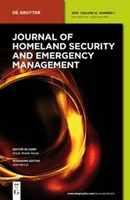
Journal of Homeland Security and Emergency Management
Scope & Guideline
Exploring the Frontiers of Homeland Security
Introduction
Aims and Scopes
- Emergency Preparedness and Response:
The journal emphasizes research on how to effectively prepare for and respond to various emergencies, including natural disasters, public health crises, and security threats. This includes evaluation of emergency management practices and the development of frameworks and tools for better response strategies. - Cross-Border and Interagency Collaboration:
A significant area of focus is the collaboration between different agencies and countries, especially in crisis situations that transcend borders. The journal explores models of cooperation, coordination, and communication among stakeholders during crises. - Impact of Technology on Emergency Management:
The integration of technology in emergency management is a recurring theme, with studies on the application of unmanned aerial systems, social media, and artificial intelligence in enhancing disaster response and recovery efforts. - Vulnerability and Resilience Assessment:
Research on assessing vulnerabilities within communities and developing resilience strategies is crucial. The journal publishes studies that evaluate risk factors and propose measures to enhance community preparedness and resilience. - Crisis Communication and Information Dissemination:
Effective communication during crises is essential, and the journal highlights research on crisis communication strategies, public perception, and the role of misinformation in shaping disaster responses. - Social and Ethical Dimensions of Emergency Management:
The journal addresses the social implications of emergency management practices, including issues of equity, access, and ethics in disaster response and recovery.
Trending and Emerging
- Resilience in the Face of Complex Disasters:
There is an increasing emphasis on understanding and enhancing community resilience in response to complex disasters, such as those arising from climate change or pandemics, reflecting a growing recognition of the interconnected nature of modern crises. - Role of Social Media and Technology:
The use of social media and emerging technologies in crisis management is a significant trend. Research is focusing on how these tools can improve communication, coordination, and situational awareness during disasters. - Health Security and Pandemic Preparedness:
The COVID-19 pandemic has heightened the focus on health security, with numerous studies examining preparedness for infectious disease outbreaks and the integration of public health principles into emergency management practices. - Crisis Communication Strategies:
Emerging themes in crisis communication strategies indicate a growing interest in how information is disseminated during emergencies, particularly in the context of misinformation and public trust. - Interdisciplinary Approaches to Emergency Management:
There is a notable trend towards interdisciplinary research that combines insights from various fields, including sociology, psychology, and environmental science, to develop more holistic approaches to emergency management.
Declining or Waning
- Focus on Traditional Security Threats:
Research specifically centered on conventional security threats, such as terrorism, appears to be decreasing. There is a shift towards broader themes of resilience and preparedness that encompass a variety of emergencies beyond traditional security. - Theoretical Studies with Limited Practical Application:
There seems to be a decline in purely theoretical research that lacks practical application in emergency management. The journal increasingly favors studies that provide actionable insights and frameworks for practitioners. - Single-Disciplinary Approaches:
There is a waning interest in studies that approach emergency management from a single disciplinary perspective. The trend is moving towards interdisciplinary research that incorporates multiple fields such as public health, technology, and social sciences.
Similar Journals
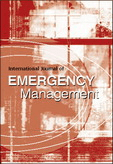
International Journal of Emergency Management
Connecting scholars and practitioners to tackle critical emergency challenges.International Journal of Emergency Management is a reputable publication within the fields of emergency medicine and strategic management, published by InderScience Enterprises Ltd. With its ISSN 1471-4825 and E-ISSN 1741-5071, this journal has been a crucial platform for scholarly research since its inception in 2003. The journal aims to disseminate high-quality, peer-reviewed articles that address critical issues related to emergency management, including but not limited to disaster preparedness, response strategies, recovery methods, and risk assessment. Despite being categorized in Q4 of both emergency medicine and strategy and management in 2023, the journal serves as an essential resource for researchers, professionals, and students looking to further explore the evolving dynamics of emergency management. It leverages its global presence, with its headquarters located in the United Kingdom, thus attracting a diverse array of contributions addressing international and interdisciplinary perspectives. The journal fosters an environment where innovative ideas can flourish, ultimately contributing towards enhancing global emergency management practices.
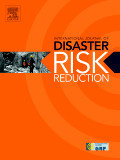
International Journal of Disaster Risk Reduction
Cultivating insights for effective risk reduction solutions.The International Journal of Disaster Risk Reduction is a leading academic publication dedicated to advancing the understanding and management of disaster risks, promoting innovative solutions and effective strategies for risk reduction. Published by ELSEVIER, this journal serves as a critical platform for researchers, professionals, and students in the fields of Geology, Geotechnical Engineering, and Safety Research. With an impressive impact factor and ranked in the top quartile (Q1) across its various categories as of 2023, it demonstrates exceptional quality and relevance in its contributions to science and engineering disciplines. The journal has been committed to disseminating high-quality research since its inception in 2012 and remains open for new submissions through 2024. The Scopus rankings reflect its prestigious position, with notable placements in Earth and Planetary Sciences and Social Sciences, highlighting its influence in shaping best practices for disaster risk governance. As an essential resource for anyone involved in disaster preparedness and mitigation, the International Journal of Disaster Risk Reduction fosters knowledge exchange and collaboration among stakeholders in the global community.

BMC EMERGENCY MEDICINE
Pioneering insights for critical healthcare challenges.BMC Emergency Medicine is a premier, open-access journal that has been at the forefront of the field of emergency medicine since its inception in 2001. Published by BMC in the United Kingdom, this journal is distinguished by its impact factor and remarkable Q1 ranking in emergency medicine, placing it among the top-tier publications in this vital area of healthcare. With a current Scopus rank of #30 out of 109 in the category of Emergency Medicine, and occupying the 72nd percentile, BMC Emergency Medicine is a leading platform for researchers and practitioners alike to disseminate their findings related to urgent and critical care. The journal embraces a broad scope within emergency medicine, encouraging submissions on a wide range of topics including clinical practice, innovative techniques, public health, and policy issues that critically affect emergency care. The open-access model ensures that high-quality research is readily available to the global community, fostering collaboration and advancing knowledge in the field. For those dedicated to improving patient outcomes in emergency settings, BMC Emergency Medicine represents an invaluable resource and community.
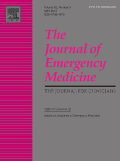
JOURNAL OF EMERGENCY MEDICINE
Advancing the frontiers of emergency care.The JOURNAL OF EMERGENCY MEDICINE, published by Elsevier Science Inc, is a premier peer-reviewed journal dedicated to advancing the field of emergency medicine. Since its inception in 1983, this journal has served as an essential resource for researchers, clinicians, and students, contributing significantly to evidence-based practices and innovations in the emergency medical landscape. With an impressive ranking of 43 out of 109 in the field of Emergency Medicine according to Scopus, and a current impact factor placing it in the Q2 quartile, this publication is recognized for its rigorous scholarly content and relevance in tackling contemporary issues in emergency care. Although it does not offer open access, the journal remains widely respected for its contribution to the global emergency medicine community, fostering new ideas and discussions that drive the field forward. For those seeking to stay at the forefront of emergency medical research, the JOURNAL OF EMERGENCY MEDICINE is an invaluable addition to your academic endeavors.

International Journal of Disaster Risk Science
Driving impactful discussions on disaster preparedness and resilience.The International Journal of Disaster Risk Science, with ISSN 2095-0055 and E-ISSN 2192-6395, is a premier, peer-reviewed open-access journal published by Springer. Since its inception in 2011, the journal has been dedicated to advancing knowledge and practice in the field of disaster risk science, facilitating critical discussions around disaster preparedness, response, and resilience across various regions of the globe. This journal holds impressive rankings, including Q1 in Geography, Planning and Development, and Q1 in Safety Research for 2023, confirming its high impact within the academic community. With converged publication years from 2010 to 2024 and being ranked in the top 10% in multiple categories, it serves as an essential resource for researchers, professionals, and students alike. As an open-access journal, it ensures that cutting-edge research is freely available, promoting wider dissemination and engagement with topical issues in disaster risk management.

Open Access Emergency Medicine
Empowering practitioners with cutting-edge emergency insights.Open Access Emergency Medicine, published by DOVE MEDICAL PRESS LTD, is a premier journal dedicated to the dynamic fields of Emergency Medicine and Emergency Nursing. With its ISSN 1179-1500, this journal has established a notable presence since its inception as an Open Access platform in 2010, offering unrestricted access to high-quality research and innovative practices in the area. As one of the leading journals in its field, it holds a respectable Q2 ranking in both Emergency Medicine and Emergency Nursing categories as of 2023, reflecting its commitment to advancing knowledge and fostering impactful research. The journal is indexed in prestigious databases with solid Scopus rankings, placing it in the 65th percentile for Emergency Medicine and the 64th percentile for Emergency Nursing, ensuring that contributions reach a diverse audience of researchers, practitioners, and students worldwide. With its focus on contemporary issues, this journal serves as an essential resource for the continual growth and development of emergency health services.
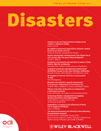
DISASTERS
Elevating disaster research to new heights since 1977.DISASTERS, published by WILEY, is a premier academic journal dedicated to advancing the understanding of disasters across multiple disciplines, including Earth and Planetary Sciences and Social Sciences. With a historical publication span from 1977 to 2024, this journal has established itself as a vital resource within the academic community, boasting a Q1 category ranking in both fields, indicating its high impact and relevance. DISASTERS ranks impressively in Scopus, holding the #27 position in General Social Sciences and #36 in General Earth and Planetary Sciences, reflecting its influence in shaping disaster research and policy. The journal serves as a platform for interdisciplinary collaboration, offering researchers, professionals, and students critical insights into disaster management, response strategies, and risk reduction measures. Although it is not an Open Access journal, DISASTERS remains a cornerstone for those looking to contribute to and stay informed about the evolving landscape of disaster studies.

Current Emergency and Hospital Medicine Reports
Transforming Emergency Medicine with Evidence-Based KnowledgeCurrent Emergency and Hospital Medicine Reports, published by Springer, is a pivotal journal in the field of emergency and hospital medicine. With a commitment to disseminating crucial research and advancements, this journal serves as a platform for sharing high-quality studies that enhance clinical practices and improve patient outcomes. As an important resource for researchers, healthcare professionals, and students, it caters to the growing need for evidence-based knowledge in emergency medicine. Although currently not classified as open access, the journal offers a wealth of information that aligns with the latest innovations and practices in the discipline. By engaging with diverse topics, from clinical interventions to hospital management strategies, it aims to inform and inspire the next generation of practitioners and scholars in this vital field of medicine. With its ISSN of 2167-4884, Current Emergency and Hospital Medicine Reports is dedicated to advancing the frontiers of emergency healthcare through rigorous research and illuminating insights.

Frontiers in Emergency Medicine
Pioneering insights for the future of emergency healthcare.Frontiers in Emergency Medicine, published by Tehran University of Medical Sciences, stands as an essential open-access platform dedicated to advancing research and practice in the diverse fields of emergency medicine, nursing, and medical services. With a focus on publishing high-quality studies that address the emerging challenges in prehospital and emergency care settings, this journal has rapidly gained recognition since its inception in 2021. The journal's current Scopus rankings place it favorably within the top quartiles for emergency medical services and emergency nursing, making it a valuable resource for researchers and practitioners aiming to enhance patient care and operational efficiency in emergency contexts. The journal encourages submissions that explore innovative practices, clinical outcomes, and policy developments in emergency medicine, promising accessibility and visibility for authors through its open-access model. Located in Iran, Frontiers in Emergency Medicine not only serves the regional community but also aspires to impact the global discourse in emergency healthcare.

Journal of the American College of Emergency Physicians Open
Unlocking Vital Insights for Emergency Care ProfessionalsJournal of the American College of Emergency Physicians Open is a prominent Open Access journal published by WILEY that has been committed to advancing the field of emergency medicine since its inception in 2020. As a vital resource for researchers, clinicians, and students, this journal aims to disseminate innovative research findings, clinical guidelines, and educational resources that support the rapidly evolving landscape of emergency care. With a solid Q1 ranking in the emergency medicine category and positioned within the top 25 ranks of Scopus’ emergency medicine listings, the journal ensures high visibility and accessibility for critical research. As an open-access publication, it provides unrestricted access to its content, facilitating knowledge sharing and collaboration among professionals globally. The journal's significant impact on the field is reflected in its growing influence, underlining its relevance as an essential platform for advancing emergency medicine practice and research.